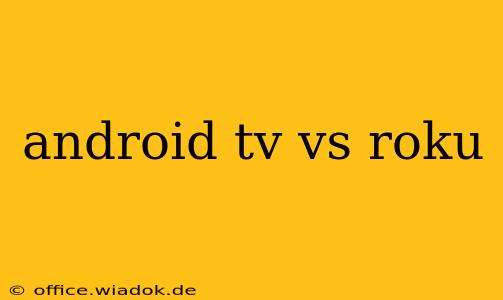Choosing the right streaming device can feel like navigating a maze. With so many options available, it's easy to get lost in the specs and features. This in-depth comparison of Android TV and Roku will help you cut through the noise and decide which platform best suits your needs. We'll delve into key areas, highlighting the strengths and weaknesses of each to help you make an informed decision.
Key Differences: A Head-to-Head Comparison
Both Android TV and Roku offer extensive streaming libraries, but their approaches differ significantly. Understanding these core distinctions is crucial for making the right choice.
1. Operating System & Interface:
-
Android TV: Known for its flexibility and open-source nature, Android TV boasts a customizable interface. You can easily rearrange apps, widgets, and settings. Its familiarity to Android smartphone users is a plus. However, this flexibility can sometimes lead to a less streamlined user experience compared to Roku.
-
Roku: Roku's interface is renowned for its simplicity and ease of navigation. The clean, intuitive design makes it incredibly user-friendly, even for tech novices. Its focus on simplicity often trumps the customization options offered by Android TV.
2. App Selection & Availability:
-
Android TV: Accesses a vast library of apps, including many niche streaming services and gaming options. This wider selection often caters to more specific viewing preferences. However, the sheer number of apps might feel overwhelming to some users.
-
Roku: Boasts a comprehensive selection of popular streaming apps. While it might not have quite the niche breadth of Android TV, it covers the vast majority of services most users will want, ensuring a smooth and efficient experience.
3. Gaming Capabilities:
-
Android TV: Offers superior gaming capabilities due to its more powerful hardware and broader compatibility with Android games. You'll find a wider range of casual and even some more demanding games.
-
Roku: Primarily focuses on streaming, with limited gaming options available. While you'll find some casual games, it's not a platform known for its gaming prowess.
4. Voice Control & Search:
-
Android TV: Typically integrates Google Assistant, providing robust voice control and search functionality. You can use your voice to search for content, control playback, and even manage smart home devices.
-
Roku: Also offers voice search capabilities, although its integration might vary slightly depending on the device model. The search functionality is generally efficient and effective.
5. Customization & Personalization:
-
Android TV: Provides extensive customization options, allowing you to tailor the interface and settings to your preferences. This includes the ability to install third-party launchers for an entirely different look and feel.
-
Roku: Offers less customization but prioritizes a consistent and user-friendly experience. While you can personalize some aspects like home screen organization, the options are less extensive than Android TV.
6. Price Point:
Both Android TV and Roku devices are available in various price ranges, from budget-friendly options to premium models with enhanced features. The price difference isn't always a clear indicator of superior performance, so consider your needs and budget carefully.
Which Platform is Right for You?
The "best" platform depends entirely on your individual priorities and preferences.
Choose Android TV if:
- You want a highly customizable experience.
- You prioritize a large app library, including niche streaming services and games.
- You need robust voice control and integration with Google Assistant and other Google services.
Choose Roku if:
- You value simplicity and ease of use above all else.
- You prioritize a clean, intuitive interface.
- You're looking for a reliable and straightforward streaming experience.
Ultimately, both Android TV and Roku offer excellent streaming experiences. Weighing the pros and cons outlined above will help you determine which platform aligns best with your individual needs and preferences. Consider your tech skills, entertainment habits, and budget to make the most informed decision.

